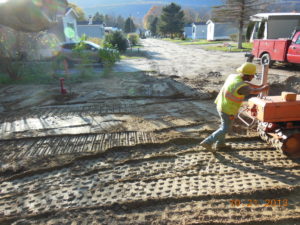[FOR IMMEDIATE RELEASE]
August 26, 2022
US Senate Could Make a Huge Difference in Housing Crisis by Voting to Fund PRICE Manufactured Housing Program
Manufactured housing is America’s largest source of unsubsidized affordable housing. Last month the House Appropriations Committee made a groundbreaking federal investment in this often stigmatized housing sector with their vote to include the Preservation and Reinvestment Initiative for Community Enhancement (PRICE) program in the Fiscal Year 2023 Transportation, Housing and Urban Development, and Related Agencies Funding Bill. As the bill moves to the Senate, there’s a real opportunity to make a huge public investment in affordable housing amid the housing crisis escalating across the nation.

The $500 million PRICE program will provide grants to Resident Owned Communities (ROCs), as well as cooperatives, non-profits, local and state governments, lending institutions and other housing agencies to support both infrastructure improvements and services in manufactured housing communities (MHCs), sometimes referred to as mobile home parks. PRICE will also support acquisitions, including resident purchases. The program will directly impact over 7,500 households that are non-profits or co-ops and open up the possibility of resident ownership for the 45,000 households that live in manufactured housing across New England.
“This will be a game-changing program,” says Joe Cicirelli, program director for New England Resident Owned Communities at the Cooperative Development Institute. “PRICE is a historic opportunity to secure affordable, stable housing for working families, seniors, and low and middle-income populations.”
In privately owned MHCs, residents own their homes but not the land on which they sit. Residents don’t have a say in park rules, rent, maintenance, and other living conditions. As the premier cooperative business center in the Northeast, and a ROC USA assistance provider, CDI provides an alternative to this model. CDI assists residents to purchase their communities from corporate or private landlords and democratically manage them as resident-owned limited equity cooperatives or ROCs. In the past ten years, CDI has helped convert 58 across New England, totaling 5,547 homes in the region.
Converting to resident ownership supports permanent affordability by removing a community from the speculative market, ending a cycle of sale and resale, and reinvesting surplus operating funds back into the community. ROCs allocate these funds to community improvement projects like road repair, environmental management, and even sustainability initiatives like community gardens and solar panels. On average, rents at ROCs rise at about 1% annually, compared to nearly 4% per year at commercially owned parks. A 2022 study found that after just five years of resident ownership, ROC members saved an average of $600 annually, with site fees at 11% below the market rate. These cost savings are crucial to the many ROC residents who are living on low or fixed incomes. Nationally, 56% of ROC residents live at or below 50% AMI. Investing in the well-being of ROCs is essential to preserving community wealth and keeping families in their homes.
In the last few years, private equity companies have been purchasing mobile home communities at an alarming rate. These investor-driven companies view residents as captive consumers. Private equity has access to government-backed loans to finance purchases. They raise rents and push out homeowners who have nowhere else to go, inflating the overall market and furthering the nation’s housing affordability crisis. As costs skyrocket, it is increasingly difficult for residents to afford to cooperatively purchase their parks. The PRICE program is a hopeful intervention, making federal funds available to communities who want to do so. The House’s overwhelming approval of the PRICE program shows the credibility of the ROC model as an important solution to the deepening housing crisis.
The PRICE program would be a critical lifeline for ROCs to address decades of inadequate systems that impact their quality of life and the preservation of natural resources. Because most parks are on private land and not maintained by a town or municipality, all infrastructure needs, including water, sewage, roads, and other utilities, fall on MHC owners, whether residents or companies. Many corporate landlords pocket lot rent and defer necessary maintenance and repairs, valuing profit over the safety and health of residents and tenants.
For example:
- In Massachusetts, the 198-home Wheel Estates Tenants’ Association in North Adams has been working diligently to repair their deteriorating sewer collection system. Some of the system is constructed with outdated Orangeburg pipe, which has caused wastewater to leak. At nearly 60 years old, the entire sewer collection system should be replaced in the next several years, but the community cannot afford to replace it on their own without raising lot rents significantly beyond what residents can afford.
- In the last six weeks alone the Pemaquid Villas Cooperative in Bristol, Maine has encountered myriad issues that jeopardize the livability of their community. They have had part of a road washed away due to a lack of culverts, old pumps failing, tree roots growing under the dirt roads, and pipes breaking. Due to lack of funds, they are forced to be reactive rather than proactive. “We need many, many mature trees taken down and got a quote for over $50,000, but we can’t afford that, so we have one tree taken down at a time, and it costs $2000 each!” said Kay Santorineos, Board Secretary. “We’re throwing good money away by doing repairs that are quick fixes because we don’t have the money to do it properly.”
- In Vermont, Milton Mobile Home Cooperative purchased their 99-home MHC in February 2012 and has been struggling to raise capital for a new wastewater system ever since. In the meantime, Milton residents have had to pay to pump now-failing on-site systems. Residents have even had to pay tens of thousands to replace some on-site systems out of necessity while they wait to upgrade to a new system.

Dire infrastructure needs also pose a challenge to MHCs that want to convert to resident ownership but struggle to fund the purchase price and the costs to fix years of disrepair. Unlike private equity purchases, a ROC model purchase includes the repair or replacement of critical life support systems within a community. Before residents purchase, engineers assess the status of water, wastewater, electrical, and road systems and resident cooperatives include any needed repairs in their capital improvement plan. This includes identifying sources of funding, which are most often additional loans to the cooperative, thus putting more strain on a possible resident purchase. PRICE would help residents access necessary federal grants to ensure that their homes, neighborhoods, and the natural world are safe and livable.
The future of PRICE is now in the hands of the Senate, with a vote anticipated sometime in the fall. At a time when so many are strapped for answers to our nation’s housing crisis, the Senate has a real opportunity to make a difference for low-income homeowners across Massachusetts.
Deb Winiewicz is the Board President of Halifax Estates in Halifax, MA, and has been advocating for the needs of her community since they incorporated in 2016. “Halifax Estates is a 55+ community and most residents are on a fixed income. Public investment would help repair outdated infrastructure such as septic systems, electrical panels, road paving, and tree removal,” Winiewicz remarked. “Federal funding for this would take the burden off of residents who are currently funding these projects with their lot rent alone.”
#####
Contact Information:
Cooperative Development Institute
Catherine Buxton, Communications Manager
(978) 382 2629, cbuxton@cdi.coop
